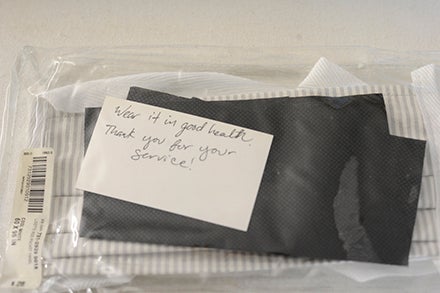Watson In Homes shifts production from design to COVID-19 demand
Published 6:22 pm Thursday, April 9, 2020
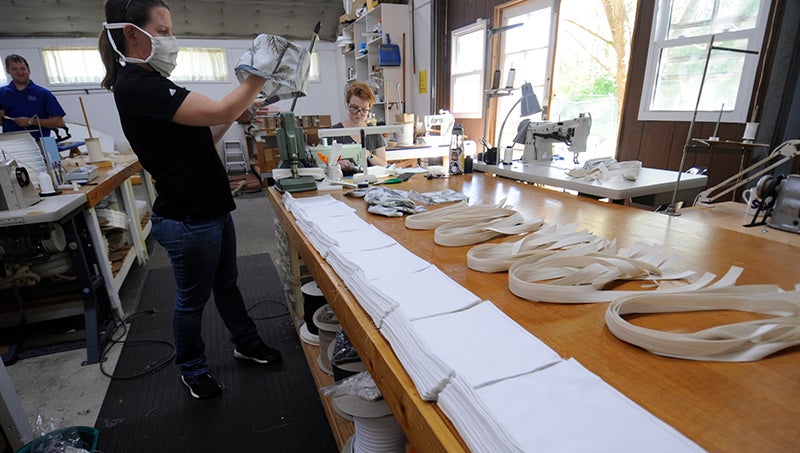
- ASSEMBLY LINE: At Watson In Homes, these small stacks of fabric will be transformed into professional-grade surgical masks to meet a growing demand for personal protective equipment. Currently, the small upholstery shop is filling a Vidant Health request for 4,000 face masks, all of which will be donated. (Vail Stewart Rumley/Daily News)
|
Getting your Trinity Audio player ready...
|
Susan and Jeremy Watson are used to switching gears. The owners of Watson In Homes, an upholstering and interior design shop in Washington, flow with client demand as trends change every year — paisleys to herringbones, neutrals to flamboyant colors, coastal charm to traditional cottage. But never have the Watsons changed gears so quickly and so passionately.
In a week’s time, all their upholstering projects have been put on the back burner as the shop has been transformed to a mask-making assembly line.
“I never saw this coming — still can’t really believe it,” laughed Susan Watson. “I’m still waking up in the morning, going ‘What am I doing? How did I get here?’”
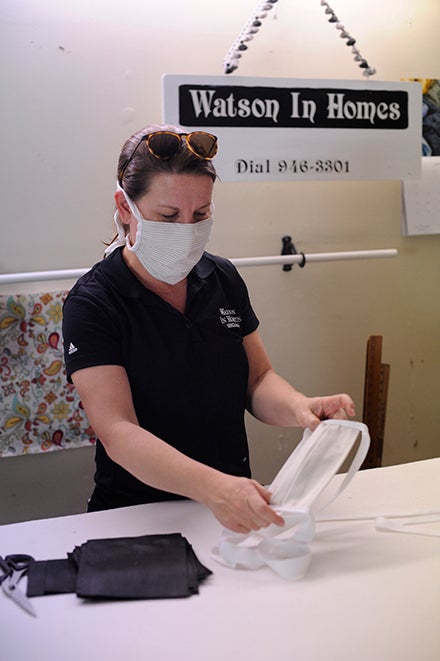
PATTERNED: Susan Watson demonstrates how the these 100% cotton, double-layered, pleated surgical-style masks with an opening for removable, replaceable filters are made.
It happened nearly two weeks ago, when she began hearing reports about shortages of personal protective equipment and how health care providers could be exposed to COVID-19 because of that lack. Watson reached out to her sister, a critical care nurse at Vidant Medical Center in Greenville, and a few other friends in the medical profession — all of them responded that, yes, there was a need for more face masks, if not in their professional environment, then personally.
“I started making them for friends and family, but it seems like the need was ramping up,” Watson said.
The Watsons have long had a relationship with Vidant Health — they regularly reupholster the system’s damaged vinyl exam tables. When she called her contact to ask whether there was a need for more protective gear, she was quickly put in touch with Dr. Michael Zimmer, a Vidant senior business analyst who heads up Vidant’s search for resources.
“He was immediately like, ‘How many can you make? How are you making them? This is what we need. This is what we can provide,’” Watson said. “That’s when I decided Watson in Homes, we were going to do this. … Hey, there’s a need — I got the tools, I got the skills. Let’s do it.”
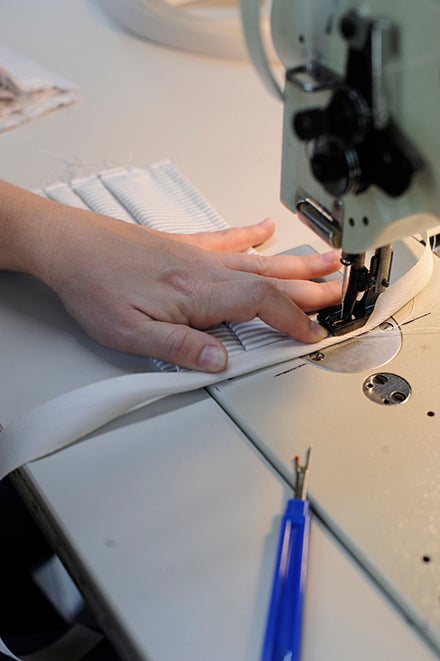
COMING TOGETHER: Susan Watson sews the ties onto the pleated surgical mask. Ties, rather than elastic bands that hook behind the ears, are more comfortable for those wearing masks for multiple hours a day.
Watson put a post on Facebook that Friday night, largely to let her current and future customers know they’d be putting Watson In Homes projects on hold for a little while. The response wasn’t what she was expecting.
“That kind of caught fire,” Watson said. “Saturday morning, I had requests pouring in from all over the place: chief of police, City of Washington, funeral homes, Beaufort County Emergency Services.”
There were so many requests, she had to turn them down. Currently, Watson in Homes has enough funds to make another 750 masks. Vidant has requested 4,000. Washington (noon) Rotary has donated $2,000 to the effort, and a friend started a GoFundMe account this week so the Watsons can buy more supplies.
“This took off overnight. I didn’t expect it to snowball like it did,” Watson said.
The tables where fabrics were cut for wing chairs, sofas and drapes are now dedicated to cutting much smaller pieces of 100% cotton from the Hanes mill in Winston-Salem. Neat stacks of fabric that will become double-layered, pleated surgical-style masks with an opening for removable, replaceable filters, line up behind sewing machines. The Watsons dropped off their first donation of 50 masks to Vidant Foundation on Wednesday; they dropped off another 40-plus to friends and family on the medical front lines.
“At this point, I am fully committed to just making them for Vidant — that’s where they’re needed, and that’s where they need to go,” Watson said.
She said anyone who is making cloth face masks at home, but does not have a place to donate them, is welcome to bring them to Watson In Homes. They will be used to fill the additional requests she’s received.
“I’m trying to put as many masks on as many faces as I can,” Watson said. “I’m just making what needs to be made and trying to get them in the right hands. This is what we’ll do until either the need goes away or something else changes.”
To donate to Watson In Homes’ GoFundMe account, visit gofundme.com/f/help-upholsterer-make-masks-and-surgical-caps. Each surgical mask is estimated to cost $8.50 for materials. All PPE made by Watson In Homes is being donated.
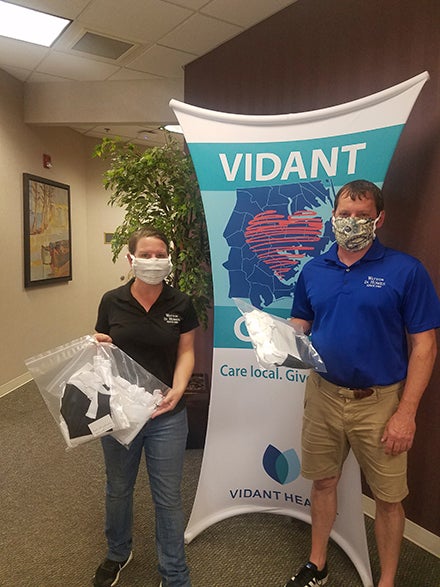
DONATION: Susan and Jeremy Watson donated the first round of face masks to Vidant Health on Wednesday. Both in the shop and outside in the world, the Watsons are observing all preventative measures to stop the transmission of COVID-19.


